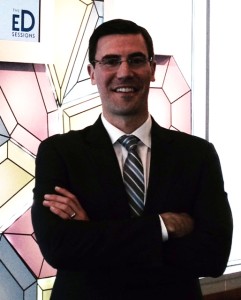- Public confidence in American education is trending down.
- Hope is a stronger predictor of college success than SAT or GPA results.
- People who become successful adults figured out early what they are good at and they approached their education through a strengths-based lens.
These were just some of the many poll-driven outcomes shared by keynote speaker Brandon Busteed during an Ed Sessions luncheon on Tuesday. Busteed is the the executive director of education and workforce development for Gallup, a researched-based consulting company that has become famous for its public opinion polls.

Several hundred education leaders and lawmakers attended Busteed’s 40-minute presentation, which weighed heavy on Gallup polling results.
Busteed’s most consistent message was engagement — or lack there of.
According to a Gallup survey, student engagement goes down every year. About 76 percent of elementary students are engaged in school and the number drops to 61 percent in middle school and 44 percent in high school.
Busteed said the No. 1 way to improve student engagement is to improve teacher engagement and the best way to engage teachers is have “a great principal.”
“Easily the most important job in America is the building principal – more important than a teacher — because principals inspire and engage teachers,” Busteed said.
Busteed also said low engagement is filtering into post-secondary education and the workforce.
Only about 30 percent of America workers are engaged, 50 percent are “not terrible employees” but they are not engaged while the last 20 percent are actively disengaged, he said.
“We’re doing a pretty poor job of serving as a talent development machine,” Busteed said.
Another way to engage students is to focus their attention and learning on things they are good at or interested in.
“You have a chance to do what you’re best at every day,” he said.
Kristin Hughes, a teacher at Idaho Arts Charter School, was inspired by the luncheon presentation.
“I see changes I need to make in myself,” said Hughes, who plans to be a school administrator. “I need to talk more to the kids about grit, endurance and longevity with a commitment.”
Busteed asked the crowd: What is the ultimate outcome of an education? “Is it good grades? Is it a degree?”
He said education should lead to a “great life” and that comes with attaining these five things:
- Purpose: how you occupy your time
- Social: relationships and love in your life
- Financial: managing your economic life to reduce stress and increase security
- Physical: good health and energy to do the things you like to do
- Community: engagement and involvement in the area where you live
“All five of those elements matter, but purpose matters most and define that by saying ‘I like what I’m doing’,” Busteed said. “Boost the well being of teachers and administrators and make sure they have a chance at ‘what I do best each day’.”
Busteed concluded by saying change isn’t easy and it doesn’t have to cost a lot of money.
“The good news is, we have so much room for improvement and you don’t need to raise millions in bond money to change values and incentivize people,” he said. “Leaders can start to pay attention to these kinds of measures. We link things to performance, but there is a huge opportunity to think about measuring student and teacher engagement.”
Disclosure: Ed Sessions and Idaho Education News are funded by the J.A. and Kathryn Albertson Foundation.
